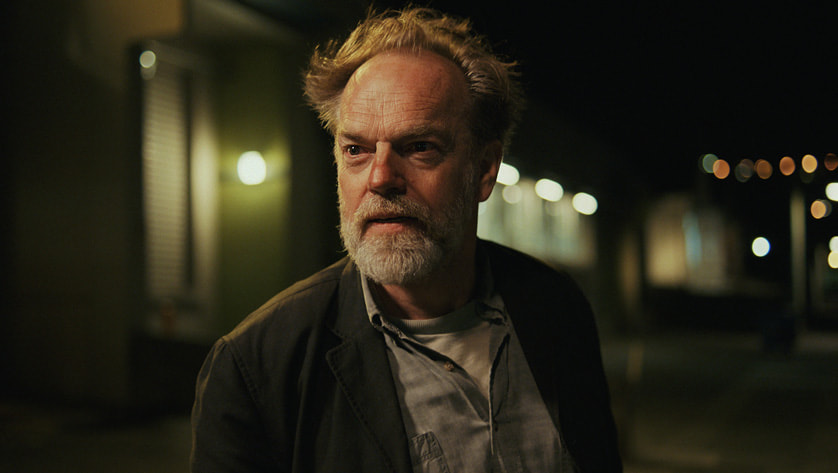What to Watch Verdict
It took nine weeks, but 'Mr. Corman' has its genuine standout episode as we meet the man who really did a number on our title character.
Pros
- +
Hugo Weaving's performance is excellent
- +
Joseph Gordon-Levitt plays well off Weaving's mix of neuroses and aggression
- +
The pandemic is more effectively woven into the story
Cons
- -
It's frustrating that the show waited this long to reveal Josh's father
- -
The ending is inexplicable
- -
Knowing how Josh got to be the way he is doesn't absolve prior episodes
How much of ourselves can we attribute to our parents? It’s the age-old question that has allowed itself to wend its way into much of the dramaturgical backbone of Western society. Parent-child issues are the core of so many different kinds of stories, but few seem as potent to filmmakers and writers as father-son issues (perhaps because most of those filmmakers and writers are themselves fathers and/or sons). Throughout the first eight episodes of Mr. Corman, the Apple TV+ show created by and starring Joseph Gordon-Levitt, the notion of our lead character’s father has hovered over the story like a cloud. We knew about him before we ever got to meet him, because he’s seemingly done quite the trick on both Josh (Gordon-Levitt) and his sister Beth (Shannon Woodward). As the season heads to its finale, it’s perhaps no surprise that the penultimate episode, also titled “Mr. Corman”, is about Josh, his father, and how the latter created the former in more ways than one.
What this episode teaches us is an unsurprising lesson: if you give Hugo Weaving twenty minutes, he will give you the world. It’s Weaving, best known to American audiences as the villainous Agent Smith from the Matrix movies, who plays Josh’s father in this episode that mostly functions as a two-hander. After we watch Josh do a parent-teacher conference over Zoom that goes sour accidentally (the parent hears Josh’s praise and finds it nice but meaningless because it’s the same kind of thing she was told as a kid), he starts getting persistent calls from his father that he chooses to ignore. It’s only when Josh’s roommate Victor (Arturo Castro) starts getting called that Josh is forced to talk to his dad, who claims he’s having a heart attack and needs a ride to the hospital, even during the pandemic.
Once Josh gives in -- as his father shouts that he’s getting dizzier and dizzier, a neurotic claim that sounds close to something Josh himself would do -- he’s infuriated to find that his dad doesn’t seem remotely as ill in person as he acted that he was on the phone. Josh’s dad begs him to spend some time with him, to get a drink or just catch up after the nearly three years that they haven’t seen each other. Josh relents enough to talk with his old man, who is gradually revealed to have been a musician when he was a younger man, an irresponsible father and grandfather, and something of a wheeler-dealer con artist who may or may be trying to get his son to give him $20,000.

“Mr. Corman” is a standout episode primarily because Hugo Weaving is an electric presence to behold, with his American accent seeming to channel the late director John Huston in its largeness and thick tones. Weaving makes Josh’s father simultaneously pathetic, heartfelt, and selfish, as Gordon-Levitt (who wrote and directed this episode) gives us more and more details about how Josh’s life was inextricably tied to his old man’s selfishness and freewheeling mentality. By the end of the episode, too, it seems clear enough that we’ve gotten a much more definitive glimpse into one of the running bits within the season, where we see from Josh’s perspective a silhouetted figure accompanied by discordant musical tones and a blinding lens flare. That, here, seems simply like Josh trying to avoid his real worst nightmare: becoming his father, a man who lost the privilege of meeting his grandchildren after being so dangerous as to let his grandson fall from a playground while he was high. Josh has a flashback near the end that clarifies his own psychological issues, wherein his dad grabs both his children and drags them outside to watch a flaming meteor in the sky. Except, of course, it’s one only Mr. Corman can see. The very last shot implies...well, it’s not exactly clear: the same meteor we’ve seen all season heading for Josh runs right into him. But it’s not a real meteor (presumably?), so the finale will have to make clear what it means that the mental flaming ball of gas has met its maker.
That shocker of a cliffhanger aside, “Mr. Corman” is primarily a very sad episode of the show, one that wisely steps back from depicting Josh himself in his typical neurotic state of mind. Here, by letting us meet Mr. Corman, we’re at least able to get a much better sense of who Josh is and why he is the way he is. It’s not enough to forgive some of the frustrating aspects of the series in its first half, but getting the idea of why Josh is so beset by neuroses is effective. It’s wildly late in the series run to do this, but effective nonetheless. It’s largely effective because Weaving is just so damn good, from his wheedling to his arrogance about his grandchildren to his tender performance of “Moon River”, a song Mr. Corman would sing Josh to sleep with when he was young. In an episode where the older Corman tries to get the younger Corman to remember key moments of his early youth, Gordon-Levitt’s reaction when Weaving busts out in “Moon River” tenderly is enormously emotional and satisfying.
So yes, it took until the ninth and second-to-last episode of Mr. Corman for Joseph Gordon-Levitt to effectively thread the needle of the show he’s been making. It’s very hard to box this show into a specific genre or style, but “Mr. Corman” is the kind of installment that’s at least good enough to justify...well, not the entire endeavor. But at least this is a very good episode of television. It’s just a shame that it took this long to get there, and doubly so because it seems highly unlikely that the finale will feature Weaving at all. But who knows? Maybe he’s on the meteor that knocks Josh out in the last shot.
The latest updates, reviews and unmissable series to watch and more!
Josh Spiegel is a freelance cultural critic who has been published in Slashfilm, SyFy, ScreenCrush, The A.V. Club, The Hollywood Reporter, The Washington Post and others. His favorite films include Singin’ in the Rain, The Rocketeer, Pinocchio and A Matter of Life and Death. His favorite TV shows include Ted Lasso, Only Murders in the Building, Deadwood and Lost. He lives in Phoenix with his wife, two sons and too many cats.


